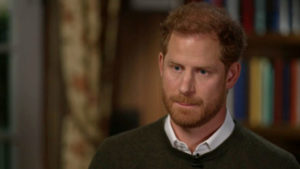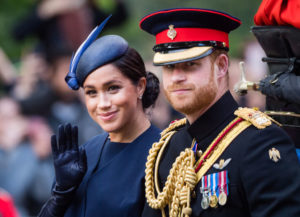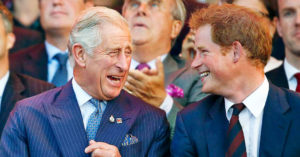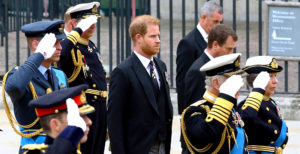Prince Harry has finally taken up the role he was always destined to fill. If Diana was, as Tony Blair dubbed her, the Princess of Hearts, Harry is her true heir: the Prince of Lolcows.
A “lolcow”, for those who don’t know, is a derogatory, very online term for someone who gains notoriety via attention-seeking behaviour, combined with imperviousness to criticism and lack of self-awareness. And 28 years ago, in 1995, in an emerging world of 24-hour news cycles and ever-hungrier tabloids, Harry’s mother became the first true lolcow. She also set the bar for media oversharing, in the notorious Martin Bashir interview that tipped her from remote, paparazzi-hounded royal to press-courting celebrity megastar. Here, Diana coyly dropped bombshell after bombshell of juicy gossip for the media, interspersed with soft-voiced woe about how awful it was that the media wanted to know everything about her.
In Spare, Harry has followed decisively in her footsteps, producing more than 400 pages of such painfully needy oversharing that every page of airport-novel prose cries out for a hug. And it does so while conveying a queasy sense of squinting through the curtains at some sordid domestic scene. Reading it left me bemused at how the people around this clearly unhappy man could have encouraged him – or at least not stopped him – over-sharing to quite such a degree.
But why do it? Why subject yourself to the hostility and humiliation that anyone could predict would follow these revelations? To a significant extent, the opportunity to lolcow himself in this way is not of Harry’s choosing. Rather, the larger context is the fact that this outdoorsy, obviously basically well-meaning-but-emotionally-mixed-up midwit was not born a prince in (as a wag observed on Twitter) an age where he could perish heroically in some ill-advised charge against Prussian cavalry. Rather, he had a prominent role thrust upon him, unasked, from birth, in an age that has made commodifying ourselves a centrepiece of culture and commerce alike.
I expected to feel exasperation and perhaps distaste reading what has by now been exhaustively trailed in every newspaper as a bombshell tell-all memoir of the notoriously private Royal Family. But I was surprised to find myself feeling deeply sorry for the Duke of Sussex. And if Spare has this unexpected effect, it’s less because it reveals him – as he presents himself – to be the innocent victim of persecutory tabloids and conniving courtiers. Rather, it’s in demonstrating just how ill-equipped he is, by temperament, to navigate the impossible choices with which fate has afflicted him.
In the decades since Diana’s death, ever greater swathes of the human soul have been redirected from human relationships to commercial exploitation. Celebrity culture is perhaps the most well-established and pervasive of such dynamics. It commodifies two other core features of our emotional landscapes, redirecting them from intimacy to profit: the social roles of gossip, and of self-disclosure. As our daily lives grow ever more atomised, we depend more and more on synthetic gossip about celebrities we don’t really know to fill the gaps in our personal “village” and provide fodder for its water-cooler conversations.
If gossip helps to oil the wheels of conversation, so too does self-disclosure. When we share something personal in a conversation, it invites an answering disclosure from the other. Over time, such disclosures create trust and intimacy. And the power of modern celebrity status comes from just such self-disclosures, but delivered asymmetrically: instead of forming part of an interpersonal exchange, the “celebrity” feeds gobbets of gossip to the publicity machine, in exchange for validation, money, or other opportunities.
Even within my modest platform, I’m conscious of this dynamic. Nothing elicits positive feedback in a column like a juicy personal anecdote. And there is always the temptation to go ever further, spilling more and more of yourself out for consumption by strangers until the result — in some quarters — becomes a kind of pornography of the self.
I can only guess at what relentless press scrutiny — which Harry calls the “fishbowl” — would feel like for someone accustomed to it at such immense scale, since childhood. Or, indeed, how such an individual might feel about the fact that its hunger was partly responsible for his own mother’s death. But if Spare depicts being endlessly “papped” as a living nightmare, it’s also in the nature of Faustian bargains, as Darran Anderson noted yesterday, to offer power as well as a horrible price. It is, after all, a function of Harry’s public profile that anyone cares about his childhood or inner life at all. And if Harry laments the way media scrutiny ruins relationship after relationship for him, he doesn’t seem able to imagine simply opting out altogether. It’s not beyond the wit of man to imagine disappearing altogether; wildly famous celebrities sometimes succeed in doing so. Instead, though, Spare recounts him rejecting an offered position as Governor-General of Bermuda, which he interprets as a plot by Camilla to get him out of the way. Well, yes, but doesn’t he want to be out of the way?
But it really doesn’t seem to just be Harry who wants to be both private, and yet also public. As Spare convincingly (if perhaps unintentionally) reveals, the entire Crown is in hock to the same bargain. At one point Harry recounts being berated by his father for taking legal action against the press, because (as Harry reports a courtier putting it) “one has to have a relationship with the press”. If Spare is to be believed, Charles tells him repeatedly just to ignore the tabloids — while playing the press like a fiddle, sometimes at the expense of his own sons, via carefully-managed leaks.
Harry’s explanation of his father’s behaviour in turn sheds light on his own tragic path to lolcow-dom. After a youth “deprived of love”, Harry speculates, Charles is “dangerously, compulsively drawn” to the “elixir” offered by the media. If Spare is at all accurate, this could apply just as well to Harry. But perhaps what damns Harry, unlike his father, to a tragic fate as lolcow is simply that he’s not very good at managing the balance between disclosure and self-protection, probably because he’s simply not cold-blooded enough. A lolcow is, in essence, someone who isn’t very good at playing the game of calculated self-disclosure; that’s Harry, to a T.
He clearly understands how avid the machine is for anything relatable. In one genuinely poignant passage, he recounts reaching for his father’s hand at the Balmoral gates, after Diana’s death, and how that gesture set off a barrage of clicking cameras: the media machine capturing an intimate moment, so it could be sold to the public. “I’d given them exactly what they wanted,” he says. “Emotion. Drama. Pain.”
But giving the public its fix of emotion, drama and pain shades over into lolcow behaviour at the point where sharing becomes a toxic cycle. In Harry’s description, at the gates of Balmoral, the cameras were weapons: “They fired and fired and fired.” And yet some go back for more nonetheless. For intimate self-disclosure to strangers rarely produces just empathy. While you may get a measure of this (and Harry has plenty of supporters) you’ll also get objectification, mockery, and further demands for personal details. Then, still needy, and still craving love and validation, those with lolcow tendencies will respond by further disclosure, thus provoking ever more objectification and so on.
My sense of the Duke of Sussex is that, unlike more cold-blooded and self-disciplined operators, he has spent his life since that moment in Balmoral reaching out again and again for a metaphorical hand-hold, only to receive in return another barrage of photography. So he’s given in, and attempted what he calls “honesty” — which is to say, flinging every personal detail into the maw of the machine at once, presumably in the hope that this will finally make the great mass of strangers like him.
Without ever leaving the same studiedly bland, tabloid-register prose, the book lurches between accounts of travel and action, grotesquely over-personal revelations, including about family members who doubtless never consented to be thus exposed, and strangely platitudinous passages of introspection. The cumulative impression is of someone who put his own personality into storage, and bought a replacement one in IKEA.
What beggars belief is the sheer level of neediness implied by such a wince-inducing level of self-exposure. But it’s hardly difficult to grasp why he should be so needy: his mother’s death haunts almost every page of Spare. He describes Diana as “light”, and reminisces about “Her devastating smile, her vulnerable eyes, her childlike love of movies and music and clothes and sweets – and us. Oh, how she loved us.”
But one twist in this heartbreak is never acknowledged. For if Harry describes the boys at his prep school as “abandoned children”, and we may infer that he considers himself abandoned, by her death, he doesn’t acknowledge that — regardless of how much she loved him — in truth his mother abandoned him before she died. “My mother legendarily said there were three people in her marriage,” he writes. “But her maths was off. She left Willy and me out of the equation.” And indeed she did, divorcing Charles and leaving her two sons behind with him, while she jetted off to beach resorts.
Unable to tip his mother off her pedestal, though, Harry recounts a youth spent seeking maternal warmth wherever it might be scrounged. Spare is full of what a therapist later tells him are “surrogate mums”: school matrons, Tiggy Legge-Bourke, and Teej, an older friend. Meanwhile the sainted Diana can do no wrong.
Perhaps, then, we shouldn’t berate him for vulnerabilities and cognitive dissonances he has, to such a great extent, inherited from her. For Spare also reveals just how far Harry is his mother’s son. He has inherited her fear of the dark, he says, “along with her nose, her blue eyes, her love of people, her hatred of smugness and fakery and all things posh”. But he seems to have followed her footsteps in more ambivalent ways, too. Spare is already as much of a voyeuristic sensation as she was. And it’s not much of a stretch to imagine Diana rationalising her own prioritisation of personal feeling over tradition and obligation much as Harry does, as part of “living in truth”.
Harry talks about fearing “a repeat of history, another untimely death like the one that had rocked this family to its core 23 years earlier”. The clear implication is that he is afraid Meghan might die in a car crash just like his mother. But my sense is that if anyone is in danger, it is Harry. For if he has inherited Diana’s nose, we may infer from Spare that he has also inherited her cocktail of vulnerability, emotional reasoning, and (shall we say) below-average analytic capacity that, combined with unasked-for levels of public scrutiny, has sealed his fate as Prince Lolcow.
Spare left me feeling genuine compassion for Harry, mingled with a queasy sense of shame for this tawdry era. Another time and culture might have afforded a man such as he an honourable life of leadership, even heroism. Instead, the 21st century has turned him into a broken reciter of Hallmark-tier therapy platitudes, hell-bent on strip-mining what’s left of public affection for him in fruitless pursuit of the empathy he clearly craves.
Arise, then, Prince Lolcow. For your own sake, please buy a few thousand acres somewhere remote, and devote yourself to something healthy and practical such as cattle farming. If you don’t, the media machine whose empathy you so self-destructively crave will continue farming you. And eventually it will grow tired of you, and torture you to death.
Disclaimer
Some of the posts we share are controversial and we do not necessarily agree with them in the whole extend. Sometimes we agree with the content or part of it but we do not agree with the narration or language. Nevertheless we find them somehow interesting, valuable and/or informative or we share them, because we strongly believe in freedom of speech, free press and journalism. We strongly encourage you to have a critical approach to all the content, do your own research and analysis to build your own opinion.
We would be glad to have your feedback.
Source: UnHerd Read the original article here: https://unherd.com/





